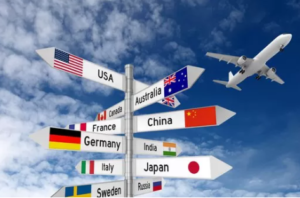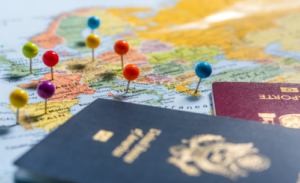Clever advice about handling money when moving overseas

Although moving to a new nation is an interesting journey, there are also certain financial difficulties involved. Your experience may be quite different depending on your ability to properly handle your money during this change. This post will go over practical advice for handling your money when moving overseas therefore guaranteeing a more seamless transition and improved financial situation.
1. Design a thorough budget.
Evaluate Your Present Financial Situation.
You should assess your present financial situation first before deciding on anything. List every debt, savings, and income source you have. This evaluation will enable you to clearly see your financial situation and guide the allocation of moving funds.
Add Relocation expenses.
As you draft your budget, consider all possible relocation costs including:
1.Travel expenses include petrol, airfare, or another kind of mobility.
Shipping and storage expenses for renting space or moving your items.
Visa and Legal Fees: Costs related to acquiring the required permits and visas.
Housing Costs: First deposits, rent or mortgage payments made in your new nation.
Creating a thorough budget guarantees your financial readiness and helps you prevent surprises.
2. Investigate Your Living Expenses.
Know Your New Target Location
Every nation has its unique cost of living; even within one nation prices might vary greatly between cities. Examine the following:
Housing Costs: Rent or property pricing in the neighbourhood you intend to call home.
Groceries and Dining: Typical eating and dining out expenses.
Transportation: Vehicle related expenses or public transit charges.
Average monthly prices for water electricity and internet access.
Contrast with Your Present Spending.
Comparing these expenses to your present ones can help you to better appreciate possible changes in your budget. This data will be quite helpful for you to modify your financial strategies.
Create a local bank account.
Value of a local bank account
Starting a bank account in your new nation will help several elements of your move related to finances. It empowers you to:
3.Steer clear of large foreign transaction costs.
Get your pay in local money free of conversion costs.
Simple local bill and expense payment.
Select the Appropriate Bank.
When choosing a bank, weigh elements including:
Monthly fees ATM withdrawal fees; overseas transfer expenses.
Locations of ATMs and branches as well as online banking tools reflect accessibility.
Services: Availability of credit cards or loans you might require.
4. Comprehend Currency Exchange Rates
Keep Knowledgeable About Rates.
Exchange rates of currencies can shift really dramatically. Knowing the present rates will enable you to decide more wisely whether you are moving money or trading currencies. To remain current, use apps or websites offering real-time exchange rates.
Timing Your Currency Exchange
Timing is quite important if you have to trade big amounts of money. Try to maximize your money by trading currencies when rates are in your advantage. Take also into account using internet services with greater rates than conventional banks.
5. Create a contingency fund.
Why an Emergency Fund is really vital?
Relocating overseas calls for an emergency fund. This fund offers a safety net for unanticipated costs including:
medical crises
Loss of employment
Unknown relocation expenses
Just how much should you save?
Try to have a financial cushion of at least three to six months’ living expenses. This sum will enable you to negotiate any financial obstacles on your road map of relocation.
6. Budget for Legal Obligations and Taxes
Recognize Tax Conventions
Knowing your tax responsibilities in both your native country and the new one is absolutely essential when moving overseas investigate the following:
Know whether your stay in the new nation will cause tax residency to be triggered or not.
Treaties on double taxes: See if your new nation is covered by a treaty from your home nation to save paying taxes twice.
See a Tax Professional
Negotiating international tax regulations can be difficult. Seeking advice from a tax consultant with experience in expatriate tax matters will help to guarantee compliance and maximize your tax position.
7. Thought about health insurance.
Value of Health Insurance
Systems of healthcare differ widely worldwide. To be sure you have enough coverage investigate the health insurance choices your new nation offers. Think of:
Local Health Insurance policies: Usually more reasonably priced than foreign policies these can offer thorough coverage.
International Health Insurance: This kind of insurance can provide more freedom if you travel often or intend to relocate once more.
Analyze Your Requirements.
Choose a plan based on your family members and your own health requirements. Remember any pre-existing conditions and make sure coverage satisfies your needs.
8. investigate local investment possibilities.
Discover Investment Prospects
If you intend to live in your new nation long term think about looking at local investment options. investigate the following:
Real Estate: Knowing the local property market will help one to see possible places of investment.
Investigate local stocks or mutual funds fit for your financial objectives.
See Professional Advice: Navigating investment choices and making wise judgments can be achieved by consulting a financial advisor conversant with the local market.
9. Track Your Expanding Costs
Make use of budgeting apps.
Budgeting applications will enable you to properly track your spending. Many apps let you track currency exchange rates, create savings goals, and even classify expenditure.
Review your budget routinely.
Review your budget often; it’s a habit worth developing. This exercise will enable you to spot areas where you might have to modify your savings or expenditure targets, so ensure your continued on track.

10. Create a Local Support SystemThe Value of Neighborhood
Creating a support system will help you both practically and emotionally throughout your move. Links with:
Many cities provide expat groups that provide guidance and assistance.
Making friends with residents will enable you to grasp the financial systems and culture more fully.
Networking for Economic Understanding
Furthermore useful financial insights can come from your network. From the experiences of others regarding handling money in your new nation pick ideas for investing and saving.
11. Remain Current with Economic Changes
Track Fiscal Situation
Remain current on the state of the economy in your new nation. Changes in the economy might impact your money including job possibilities, inflation rates and cost of living modifications.
Subscribe to Local News Sources
Following local news sources or financial magazines will give you vital updates and analysis of the state of the economy thereby guiding your financial decisions.
12. Schedule for Retirement Funds
Know Your Options Regarding Retirement
If your intended stay in your new nation is long-term you should take local retirement savings choices into account. See the following:
Local Pension Plans: Know the workings of your local pension plans and the required contributions.
Some nations let you fund foreign retirement accounts that could have tax benefits.
Spread Your Retirement Funds Differently
Key is having a varied retirement portfolio. To optimize your advantages think about keeping retirement accounts in your new and native countries.
13. Use Credit with Caution
Comprehend Credit Systems
Different countries have quite different credit systems. Managing credit cards and loans requires an awareness of how credit operates in your new nation.
Create your credit history.
Should you intend to stay long-term, you should establish a local credit history. Apply for a small loan or local credit card first then make timely payments to build a good credit record.
14. Apply financial management technology.
Make use of financial apps.
Many financial management applications abound that will enable you to track your money, create a budget, even make investments. Some well liked choices include:
Mint for tracking expenses and budgeting.
For thorough planning and financial goals use YNAB Your Need A Budget.
Robinhood: For stock based investment free of commission charges.
Traveling or shopping in your new nation might benefit much from apps offering money conversion tools. With real time exchange rates, these instruments can assist in improved financial decision making.
15. Get ready for perhaps difficult financial situations.
Predict Typical Problems
Relocating overseas should equip one for possible financial difficulties including:
Unexpected expenses always call for a buffer in your budget.
Currency Variations: Think about how your finances might be affected by changes in the value of money.
Stay Adaptable and Flexible.
Financial management isn’t fixed Stay open in your approach and ready to change your financial plans if necessary.
Finally
Moving overseas can be an exciting adventure with many of chances for both career and personal development. Still a good transfer depends on your ability to properly handle your money. These clever ideas can help you to position yourself for financial success in your new nation. As you negotiate this fascinating path keep educated be proactive and create a solid support system. Careful preparation and awareness will help you to make your move a fulfilling journey enhancing your life.